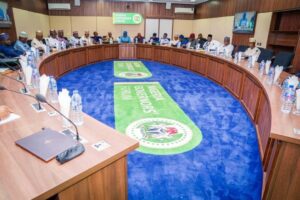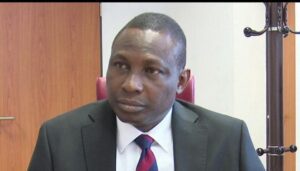
Stakeholders want FG to use cybernetic technology from Israel, others to curb criminality
Some stakeholders in security have urged the Federal Government to use cybernetic technology from Israel, Pakistan and Singapore to effectively address the current issues of insecurity and criminality in the country.
They gave the advice at the National Policy and Development Summit on Thursday in Abuja.
The conference was organised by Mr Ibrahim Hassan, the Senior Special Assistant to President Muhammadu Buhari on Policy Development and Analysis.
The theme of the conference is “Nigeria’s Security Challenges and the Way Forward”.
In his opening remark, Hassan said the essence of the summit was to engage stakeholders and security agencies in a robust discussion.
“It is not every time that we talk about the economy, so we decide to convey this meeting with stakeholders and our frontline officers to hear from their perspective on issues and way forward.
“After this meeting, we shall put together an advisory to Mr President and all the relevant security agencies and we hope it will go a long way to address the issues of insecurity in the country,” Hassan said.
A participant, Dr Ahmed Muhammad said that security was a permanent issue in the world, adding that Nigeria is not new to challenges but that things are not being address in a serious manner.
Muhammad explained that if a country did not provide security for her population, mineral resources and wealth, then such a country is bound to experience a lot of crisis.
According to him, if not checkmated, criminals can mine the country’s resources and make so much money to buy heavy weapons and begin to fight against the country.
“Our security system should be link to security institutions across the world. This will enhance our cybernetic strategy in dealing with insurgency, kidnapping, armed robbery, internet fraud and banditry.
“The Federal Government should establish security links with Israel, Pakistan and Singapore. These countries have the best cybernetic system in the world.
“Nigeria may not know sponsors of insurgency and other forms of criminality in the country. Other countries may know, but because, we don’t have anything binding with them, they may not tell or show us who the sponsors are.
“Sponsors of crimes in the country should be traced and cut off. Nigeria should collaborate with the above mentioned countries on technology to address insecurity,” Muhammad advised.
Another participant, Mrs Nkechi Akubuiro, from the Chartered Institute of Risk Management said that there was need to create awareness among the youths and reorient them on dignity of labour.
“Nigerian youths can go abroad and take up a job of washing dead bodies with dignity to get some dollars, but back home, they would not want to do such jobs, instead they will be looking for white collar jobs.
“There is also the need to emphasise on national heroes and reduction of fear by establishing a risk policy or framework that can address such.
“Also, we need to review our educational system to graduate employable individuals and provide a conducive environment for employment. Sponsors of the menace we are facing today which are mostly elites should be traced and punished,” Akubuiro said.
Another participant, Malam Umar Yakubu said, having enough security personnel to fight crimes in the country is not enough.
He suggested that effective technology should be used, adding that when such is done, our security agencies will do better than what they are doing now.
Another stakeholder, Mr Abdel-Rahaman Muhammad, the Executive Vice Chairman of Liztin Communications said cattle routes that were designed in the 1960s needed to be redesigned to checkmate the farmers-herders crisis.
Muhammad said in Saudi Arabia, technology like GPRS in phones were used by herders to dictate where they could get water for their cattle.
For Mr Julius Okoro, there was need to have more schools than prisons.
Okoro suggested that attention should be paid to the root causes of insecurity, adding that if we don’t deal with the root causes of crime, it would get worst.
He stressed that any country that did not take care of its citizens, they would come back to hurt the country.
Meanwhile the Commandant General of Nigerian Security and Civil Defence Corpse, Dr Ahmed Audi represented by Assistant Commandant General in charge of Critical Infrastructure Protection, Mr Jonathan Iyogho narrated the responsibility of the corps and its challenges.
“We need technology to assist in our work; also, unregistered SIM cards have become an issue, because criminals use them and they can’t be traced.
“The National Identity Number is a good Development, because, we need to know who and how many we are, and government should provide a conducive environment for people to do small businesses, because government cannot employ everyone.
“More importantly, there is need for synergy among all security agencies in the country, like joint task force. This will enable us to do more than what we are doing now,” he said.
Also the Minister of Interior, Mr Rauf Aregbesola, represented by his Technical Assistant, Mr Joshua Ibiloye, Deputy Commandant of the Corps said that there was need to improve on Intelligent gathering to deal with insecurity.
The summit attracted no fewer than 30 stakeholders from both the public and private sectors across the country.



